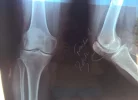I recommend that you bank on what David tells you, other than your orthopedic doctor. David is our resident witch doctor (LOL) and roaming Camino EMT. But he is always correct.
My two cents, in addition, would be to train as much as you can, but only when your doctor says it's okay. Tell the doctor what you plan to do, what the terrain is like, and what you plan to carry, weight and method.
Then, when you do plan for the Camino, consider bringing a knee brace, topical sports pain creams, and an oral analgesic, like an arthritis-strength pain reliever. Alternatively, and with the cooperation of your doctor, consider a prescription strength pain reliever (e.g. 600 mg ibuprofen). Leave opioids at home...
As a point of reference, I am nursing two knackered knees with almost no meniscus remaining. I do regular weight and flexibility exercises to strengthen the ligaments and muscles supporting my knees to take some of the burden off the meniscus. I also use nutritional supplements intended to improve my joint health.
When I walk this May, I will be applying Luxoben Forte cream (Spanish sourced) before going to sleep each night to address aches and swelling. Each morning, "breakfast" usually includes 2 arthritis strength Tylenol (paracetamol) tablets, because I KNOW it is going to start to ache after an hour's walking on the Camino.
For me, these tablets last about six hours. That is perfect timing, as I arrive at my destination after 6 - 7 hours, and one does need to apply liberal doses of cold cerveza or vino tinto...
Hope this helps.

















